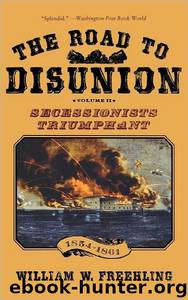The Road to Disunion: Secessionists Triumphant, 1854-1861 by William W. Freehling

Author:William W. Freehling
Language: eng
Format: mobi
Tags: History
ISBN: 9780195058154
Publisher: Oxford University Press
Published: 1990-01-02T00:00:00+00:00
CHAPTER 21
Suspicious Southerners and Lincoln’s Election
After the National Democratic Party split, could Republicans reunite the old National Whig Party elements, despite ex-Whigs’ failure to fuse in 1856? A Republican Party’s southern wing could come from two sources: from Helper-Blair-Clay heretics or from John Bell–John Crittenden–Henry Winter Davis mainstreamers. Either way, Southern Democrats claimed, Southern Republican collaborators, by thrusting free debate inside the South, would make democracy and slavery incompatible.
– 1 –
Every four years after 1836, claims of opponents’ disloyalty to slavery had smeared southern presidential campaigns. The slander had most wounded Southern Whigs, allied with northern enemies of the Fugitive Slave Law and the Kansas-Nebraska Act. In the early 1850s, Lower South Whigs had to disown those allies. Seldom again would Whiggish politicians in the most tropical South seek a national opposition to the Democracy.
But Upper South ex-Whigs, lately called Americans or Know-Nothings but now called Oppositionists, remained hopeful of fusing with Northerners who opposed the Democracy. Southern would-be fusionists dreaded any new agitation on slavery, for that issue had poisoned the old National Whig fusion. In 1856, Upper South ex-Whigs had begged former northern colleagues to attack only foreign voters. But ex–Northern Whigs more often assaulted the Slave Power. Fusion with these antisouthern Republicans would convict ex–Southern Whigs, all over again, of softness on slavery.
In early 1860, in hopes of a new fusion, Maryland’s Congressman Henry Winter Davis cast the lone southern vote for the Republicans’ William Pennington to be Speaker of the national House of Representatives. As 1860 wore on, Davis and other Upper South would-be fusionists begged Northern Republicans to spread Pennington’s silence on Hinton R. Helper to all slavery matters. The beseechers prayed for agitation only against Democrats’ economic policies. Such a National Opposition Party would stress national expansion of roads, banks, railroads, and canals. By avoiding slavery issues, a National Opposition Party would prove the old adage that sleeping dogs must be kept asleep—or rather the new adage that artificially stimulated dogs must be soothed into taking a nap. Instead of the Democracy’s proslavery agitators’ “eternal howl on the negro question,” argued Henry Winter Davis, let us realize that “the way to settle the … question is to be silent on it.”1
As a motto for a fighting cause, silence had a built-in weakness. Nonagitation usually generated colorless pacifiers. Only the rare agitator who roared for nonagitation could maximize excitement. Understanding this irony, Southern Democrats rushed to the attack when a magnetic champion of nonagitation, Richmond’s John Minor Botts, sought a reformulated National Republican Party’s presidential nomination.
Both worshippers and detesters called Botts “the Bison.” Botts possessed the right credentials to charge against the Virginia establishment: a proper father. Benjamin Botts was a famous Virginia lawyer. But John Minor’s father and mother perished in the Richmond Theater’s famous fire on the day after Christmas, 1811.
The orphan considered himself old enough, at age nine(!), to make his own way. During the nine years after flames consumed his parents, Botts streaked through school, conquering Greek, Latin, French, and mathematics, and then, in a six-week spree, the law.
Download
This site does not store any files on its server. We only index and link to content provided by other sites. Please contact the content providers to delete copyright contents if any and email us, we'll remove relevant links or contents immediately.
| Africa | Americas |
| Arctic & Antarctica | Asia |
| Australia & Oceania | Europe |
| Middle East | Russia |
| United States | World |
| Ancient Civilizations | Military |
| Historical Study & Educational Resources |
1861 by Adam Goodheart(1047)
Smithsonian Civil War by Smithsonian Institution(1007)
Abraham Lincoln: A Life, Volume 2 by Michael Burlingame(957)
The Fiery Trial by Eric Foner(940)
Ulysses S. Grant by Michael Korda(929)
Rock of Chickamauga(924)
Battle Cry of Freedom by James M. McPherson(921)
Rebel Yell: The Violence, Passion, and Redemption of Stonewall Jackson by S. C. Gwynne(909)
101 Things You Didn't Know About Lincoln by Brian Thornton(907)
Abraham Lincoln in the Kitchen by Rae Katherine Eighmey(854)
This Republic of Suffering: Death and the American Civil War by Drew Gilpin Faust(833)
Bloody Engagements by John R. Kelso(814)
Union by Colin Woodard(800)
Lincoln's Lieutenants by Stephen W. Sears(794)
Leaves of Grass by Walt Whitman(790)
The escape and suicide of John Wilkes Booth : or, The first true account of Lincoln's assassination, containing a complete confession by Booth(764)
1861: The Civil War Awakening by Adam Goodheart(746)
Rise to Greatness by David Von Drehle(719)
The Fiery Trial: Abraham Lincoln and American Slavery by Eric Foner(719)
